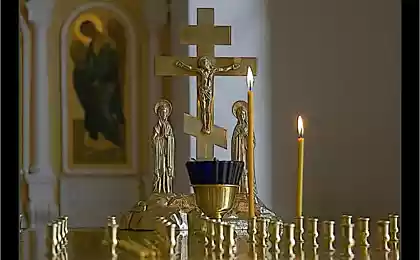570
The host.What is the antidoron?

Prosphora (Greek for "offering") is the liturgical bread used for the sacrament of the Eucharist and remembrance in prayer during the offertory of the living and the dead.
Communion bread in the Orthodox Church, following the example of the first Christians, is baked of leavened dough, made from best wheat flour, without any admixture, zameshennoy on clean water, salt, starter culture of yeast and Holy water.
The host consists of two parts, which are made from the dough separately from one another and then joined together. On top of a stamp depicting an equilateral four-pointed cross with inscriptions over the crossbar of the cross and IC XC (Jesus Christ), under the crossbar NI KA (Greek for victory) or, exceptionally, by a special resolution of) the image of a Saint.
The host consists of two parts: in commemoration of the two natures of Jesus Christ — divine and human.
SV. Simeon of Thessalonica about leavened bread says:
"Bread is leavened bread, as if animate through the brew and truly perfect... It shows that the Word of God, it is: for us took flesh; It was incarnated not by changing His nature, and with verbal and intelligent soul took mankind, was perfect God and perfect Man, and I voscosity... just In bread with leaven, there are three substances, because our soul is tripartite and in honor of the Trinity. Flour with leaven means the soul, water baptism, and the salt signifies the mind and teaching of the Word, Who said to his disciples: "You are the salt of the earth". The bread, baked by fire, shows that the God of all connected with us and gives us His help and assistance, and especially the fact that It's all connected with all of our nature."
The host as its origin goes back to antiquity.
In the old Testament there was a commandment about the offering of the bread in the sacrifice: "though he brings his offering leavened bread with the sacrifice of grateful peace" (Lev. 7, 13).
The origin of ducastel) also find in the old Testament.
St. Simeon of Thessalonica says: "All gave Moses inside the tabernacle, especially the ark and the table, preobrazovanie the virgin, was called the Holy of holies.... Was in the tabernacle and the shewbread, two of his compositions meaning the living bread and the celestial, i.e., the two natures, human and divine".
The unleavened bread in ancient times was called the offering of bread, wine, oil, wax for candles, with which the first Christians came to the temple for Liturgy. Of these voluntary offerings separated part of the bread and wine for the Sacrament of the Eucharist, the other part tasted at the fraternal repast.
This offering (Greek prosphora), or a donation was received by the deacons; the names brought has made a special list, which prayer was proclaimed during the consecration of the gifts. Relatives and friends of the deceased made offerings from their name, and the names of the dead, included in the list are remembered in prayer.
Subsequently, the host began to call the bread used for the Liturgy. Over time, steel instead of ordinary bread specially to bake communion bread in the Church, taking as a donation in addition to the usual offerings and money.
The host can get at the candle after the Liturgy, by submitting prior to the start of worship a note On "health" or "for the repose". The names specified in the notes, are read at the altar, and for each of the wafers is removed particle.
The Eucharist is sacred and believers reverently partake of her before making any food. Parents should teach their children to relate with reverence to the Eucharist, the right to eat and not to let the crumbs fall onto the floor.
Eucharist stored in a corner near the Holy icons, in a clean container, not with other foods.
Spoiled Eucharist should burn yourself (or take to the Church).
Prayer for the acceptance of the communion bread and Holy water
O Lord my God, let it be the gift of Your Holy and Your Holy water in the enlightenment of my mind, strengthening the body and soul, my strength, in health of soul and body mine, in the conquest of the passions and infirmities of my boundless mercy to Your prayers of Thy most pure Mother and all Thy Saints. Amen.
What is antidoron:
At the end of the Liturgy, the worshipers hear the antidoron — small pieces of wafers from which the offertory was taken out of the Holy lamb. The Greek word antidoron comes from the words anti "instead" and Dee Oron – "the gift", that is the exact translation of this word is westdale.
"Antidoron," says St. Simeon of Thessalonica,- is the sacred bread, which was brought to offer and of which the middle was removed and used for the priest; the bread depicted as the spear and took the divine word, is taught instead of the terrible Gifts, then there are Mysteries to those without partaking of them."
The custom to distribute the antidoron originated, apparently, in order to give some consolation and sanctification of those who do not take communion during the Liturgy. Instead of the Holy Gifts, they began to distribute the loaves, which remained from the bloodless sacrifice.
The first evidence for the passing around of a particle of antidoron is not Holy Mysteries precaseptica refers to VII century and in regulation IX Kamenetskogo Cathedral in Gaul.
In the Eastern Church, the oldest mention of the antidoron can be considered evidence of "exposition of the Liturgy" Herman of Constantinople according to the list of XI century. Then you should specify the certificate Balsamon (XII century) in the 15th reply of Alexandria Patriarch Mark.
According to the Nomocanon, in case of insufficiency for antidoron particles), from which is removed the Holy lamb, can be used for its preparation, prosphora in honor of the blessed virgin. According to the indication of the rudder, the antidoron is not taught wrong and under epitimia.
The antidoron should accept reverently with folded hands cross, right to left, kissing and feeding this gift the priest's hand. According to the rules of the Church, the antidoron should be eaten in the temple, fasting and with reverence because it is Holy bread, the bread from the altar of God, the offerings to the altar of Christ, from which it receives heavenly sanctification.
The plot to the host from all disease :
"In deliverance and healing be a gift to this,
The Divine words of the gospel but will be healed
will fade and disappear all sorts bolesti and Hvorost.
Let this serve as a gift in divine healing
assistance and rebirth.
Words of our Lord Jesus Christ:
I am the truth, rebirth and life.
In the name of the Father and of the Son and of the Holy spirit.
And now and ever and unto the ages of ages.
Amen. "
Read seven times and eat. Washed down with Holy water. published
P. S. And remember, only by changing their consumption — together we change the world! ©
Source: www.verapravoslavnaya.ru/?Prosfora-alf
Blood pressure: what is actually meant by these strange figures
How to quickly earn in crisis: the cultivation of strawberries and raspberries





















